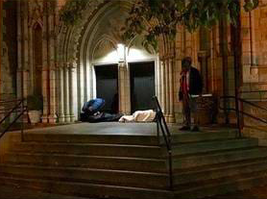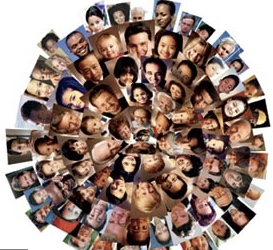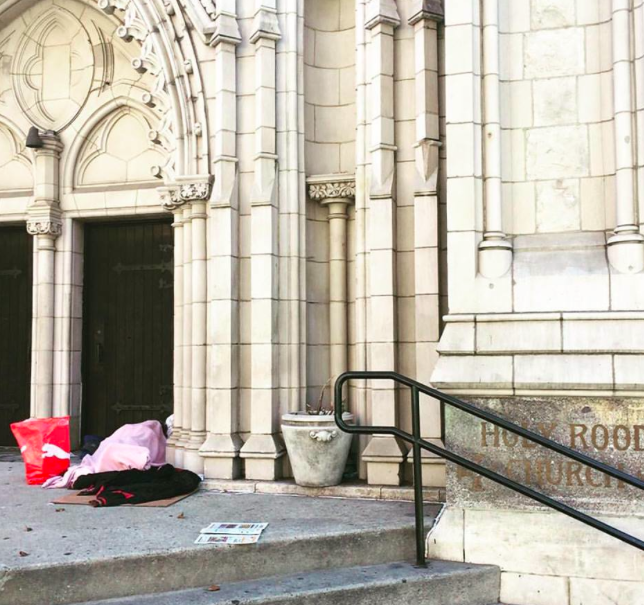 Power does not naturally distribute power equitably. This is why, first and foremost, calling upon the powers to distribute power more fairly (whether government, industrial complexes, religious institutions, or business corporations) will not address the problem of power being more equitably distributed. When politicians and civic leaders get elected or into positions because they promise more equitable distribution of power, once in power, they have an idolatrous temptation to remain in power over the very people they claim to advocate for—so, they, too, will not naturally be given to share that power more equitably. As was once said, power corrupts; absolute power corrupts absolutely. The only place power is distributed equitably is at that Table in the (better, yet, a) gathered-church. And, this is exactly what happened in the Book of Acts. This is the background of New Testament Letters like Romans, Galatians, and James; and, for the early church (for the first 150 years or so) . . . and, which, now, should be happening at every gathered-church of strangers and unequals in every locale, on every street, in every neighborhood, and within every community. This is at least one reason why the church, a the local gathered-church, is so, so important. Where this isn’t happening in a local church (i.e., a gathering of strangers and unequals at worship and at Table), there needs to be lament and repentance and correction in righteousness. Our problem is that much of the church (local and institutional) has so aligned with Christendom (that is, a culture that steals from Christianity just enough to control the industrial-church-complex and its own citizenry, but is formed by power-idolatries, such as ours here in the West) that, we, too, have become a power (or powers) that do not naturally distribute power equitably. But this isn’t the gospel, nor is it the body of Christ prescribed in the New Testament. But we didn't learn Christ this way (Ephesians 4:20; cf. 4:17–32). Yet, this is the place (the gathered-church) where power is defeated (Ephesians 6:10-12; Colossians 2:15) and the place where the only power known is the crucified power of the cross of Christ (Gal 2:20). This is the place where “there is neither Jew nor Greek, there is neither slave nor free, there is no male and female” (Gal 3:28); for this is the place all, by one Spirit, have been “baptized into one body—Jews or Greeks, slaves or free—and all were made to drink of one Spirit” (1 Corinthians 12:13); a space “where no Greek and Jew is, that is (kai) [where there is no] circumcised and uncircumcised, barbarian, Scythian, slave, freeman, but all things and in all is Messiah” (Colossians 3:11, my translation). Given that we are subject and, too often, align ourselves to the powers (at least the side of power we like or identify with or the side that seems to give us power, which is an illusion, of course). It is too natural to believe our only recourse for justice is to call upon those in power (i.e., the State or the industrial-complex) to give up power and more equitably redistribute power. But they will not, no matter how much they promise. However, the harder work—which is God’s way in this world now that Christ Jesus has died, been raised, and ascended to the right hand of the Father, and the church, the local gathered-church is His body, His presence in a community—the harder work is ecclesiastical, not simply protest, advocacy, and, certainly not, voting correctly. Our contemporary church-power and the way we tend to advocate in the public square mimics the current systems of power, so it is natural to have “Christian leaders” gain power, who develop followings as a demonstration of their power, to call upon the powers of government and systems of power to do justly. And to punish those who do not. So, what we have—what we end up with--is only “power” vs. “power.” But what God wants is crucified with Christ-power among the church, that is, our local churches (rural, suburban, exurban, and urban), and in church planting (especially in the harder places, the hinterland places, the geographically “unlivable” (and unlikeable) places, the marginal places, the border-places, the places where there is the lack of power).
There is no doubt in my mind. There is no way around it. The issue and problems of justice are a Table issue where the gathered-church exists. We are called to the harder task, church, where justice, that is, the place where the more equitable distribution of power can be experienced, demonstrated, and displayed.
0 Comments
 When the church, a church, or Christians align with a political agenda (right or left), there is great risk that innocent people will be put in harms way and, most certainly, whatever power is shared (between party and church et al.) is earthly power (but can be confused as God’s blessing). Perhaps this is why Jesus didn’t challenge his new flock to take over the Roman or Jewish government or defeat the High Priest or Caesar. The NT seems to present the church’s revolutionary power within a different model, a wholly other platform and venue. It is in the arena (literally) where Christians met certain death wherein the church had a platform for cultural and social change. Despite the musings of some that the early Jesus movement was a protest against an oppressive Empire, the apostolic and early church lacked the power and any public platform for social and cultural change. However, the household temple-church filled in Spirit was and is the platform for making known God’s cosmic reconciliation through which cultural and social change is inaugurated in the world, particularly the worlds of our neighborhoods and communities. The local church, that is, gathered congregations of people who identify with the Lamb who was slain and follow in the ways of Jesus, is the space where God brought and still seeks to bring about cultural and social change. Church—more so, local churches—is how God changed an empire and defeated Caesar. We need to consider this when asked, "How does Christianity address the issues pressing upon us today" or "What should Christians do to confront the issues of race, abortion, poverty, greed . . . ?" Christians did not “take to the streets,” but they made known God’s cosmic reconciliation as household temple-churches through the reoriented relationships of reciprocity as described in Ephesians 5:21-6:9. Paul called the gathered Christians, in particular Gentile Christian men (i.e., the husbands-fathers-masters), to act against their own social self-interests and against the norms of the dominant culture, literally taking up arms against the empire by adopting the reconciled, sacrificial love of Messiah Jesus, demonstrating reciprocity to wives, children, and slaves. Paul advocated the first #Wives/WomenLivesMatter, #ChildrenLivesMatter, and #SlavesLivesMatter (right there in Ephesians 5:21-6:9). The church venue was the incubator and model for systemic social change. The local church must now live “no longer as the Gentiles walk” (Ephesians 4:17). Paul did not seek to overthrow the authority structures of the culture in which the church found itself. But he does instruct the multihouseholds of God, the all-welcoming worshipping temple-church venues, in a new way of relating to one another in Messiah. This is one of the strongest arguments against homogenous churches and for multi-demographic churches. |
AuthorChip M. Anderson, advocate for biblical social action; pastor of an urban church plant in the Hill neighborhood of New Haven, CT; husband, father, author, former Greek & NT professor; and, 19 years involved with social action. Archives
February 2024
Categories
All
|
Pages |
More Pages |
|

 RSS Feed
RSS Feed